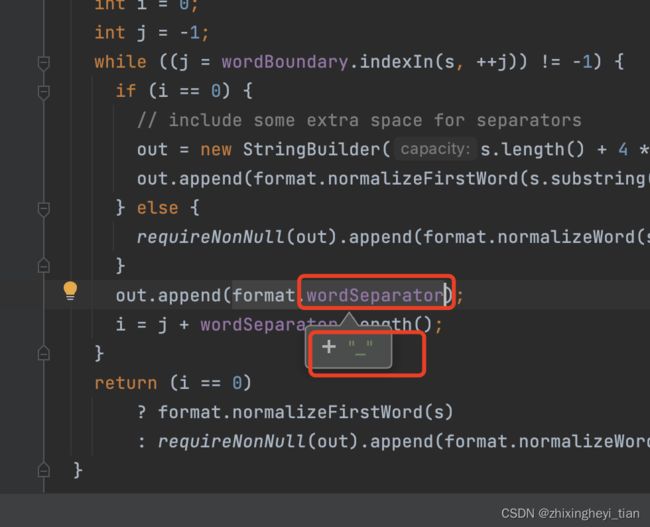Trino 源码剖析
Functions
function 反射和注册
io.trino.operator.scalar.annotations.ScalarFromAnnotationsParser
这里是提取注解元素的方法
String baseName = scalarFunction.value().isEmpty() ? camelToSnake(annotatedName(annotated)) : scalarFunction.value();
这里如果 scalarFunction 的注解没有没有值,直接对函数名进行snake命名法
一般程序设计中,有两种变量命名规范:Snake方式和Camel方式。
- Snake方式是指单词用小写字母,单词间下划线(“_”)代替空格;
- Camel方式是指相邻单词首字母用大写表示,对单词加以区分。
例如,你想定义一个变量表示一个数组数字之和,并且用英文“sum of array”。我们使用Snake方式的变量名为:sum_of_array;用Camel命名方式的变量名为:sumOfArray。
public static List fromAnnotatedElement(AnnotatedElement annotated)
{
ScalarFunction scalarFunction = annotated.getAnnotation(ScalarFunction.class);
ScalarOperator scalarOperator = annotated.getAnnotation(ScalarOperator.class);
Optional description = parseDescription(annotated);
ImmutableList.Builder builder = ImmutableList.builder();
if (scalarFunction != null) {
String baseName = scalarFunction.value().isEmpty() ? camelToSnake(annotatedName(annotated)) : scalarFunction.value();
builder.add(new ScalarImplementationHeader(baseName, new ScalarHeader(description, scalarFunction.hidden(), scalarFunction.deterministic())));
for (String alias : scalarFunction.alias()) {
builder.add(new ScalarImplementationHeader(alias, new ScalarHeader(description, scalarFunction.hidden(), scalarFunction.deterministic())));
}
}
if (scalarOperator != null) {
builder.add(new ScalarImplementationHeader(scalarOperator.value(), new ScalarHeader(description, true, true)));
}
List result = builder.build();
checkArgument(!result.isEmpty());
return result;
}
io.trino.operator.scalar.annotations.ScalarImplementationHeader

private static String annotatedName(AnnotatedElement annotatedElement)
{
if (annotatedElement instanceof Class) {
return ((Class) annotatedElement).getSimpleName();
}
if (annotatedElement instanceof Method) {
return ((Method) annotatedElement).getName();
}
checkArgument(false, "Only Classes and Methods are supported as annotated elements.");
return null;
}
由上可得 method 也是一种 AnnotatedElement
trino 中的 snake 命名法
io.trino.operator.scalar.annotations.ScalarImplementationHeader
private static String camelToSnake(String name)
{
return LOWER_CAMEL.to(LOWER_UNDERSCORE, name);
}
com.google.common.base.CaseFormat
/**
* Converts the specified {@code String str} from this format to the specified {@code format}. A
* "best effort" approach is taken; if {@code str} does not conform to the assumed format, then
* the behavior of this method is undefined but we make a reasonable effort at converting anyway.
*/
public final String to(CaseFormat format, String str) {
checkNotNull(format);
checkNotNull(str);
return (format == this) ? str : convert(format, str);
}
/** Enum values can override for performance reasons. */
String convert(CaseFormat format, String s) {
// deal with camel conversion
StringBuilder out = null;
int i = 0;
int j = -1;
while ((j = wordBoundary.indexIn(s, ++j)) != -1) {
if (i == 0) {
// include some extra space for separators
out = new StringBuilder(s.length() + 4 * format.wordSeparator.length());
out.append(format.normalizeFirstWord(s.substring(i, j)));
} else {
requireNonNull(out).append(format.normalizeWord(s.substring(i, j)));
}
out.append(format.wordSeparator);
i = j + wordSeparator.length();
}
return (i == 0)
? format.normalizeFirstWord(s)
: requireNonNull(out).append(format.normalizeWord(s.substring(i))).toString();
}
Plugins
When you implement a new Trino plugin, you implement interfaces and override methods defined by the Service Provider Interface (SPI).
Every Trino plugin should be in a separate directory. Do not put JAR files directly into the plugin directory. Plugins should only contain JAR files, so any subdirectories will not be traversed and will be ignored.
- By default, the plugin directory is the plugin directory relative to the directory in which Trino is installed, but it is configurable using the configuration variable plugin.dir. In order for Trino to pick up the new plugin, you must restart Trino.
- Plugins must be installed on all nodes in the Trino cluster (coordinator and workers).
